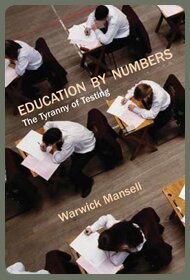Most newspapers have included opinion pieces on the testing regime in recent days, with few articles dissenting from what seems now to be the mainstream view that serious reform is needed. This, of course, has been triggered in large part by the chaos of this summer’s marking, overseen by the now-sacked contractor ETS Europe.
Ed Balls, in an article in The Independent, argued that the administrative problems surrounding this year’s Sats should not encourage people to lose sight of the “bigger picture”, which is that the tests have been an important lever in “driving up standards”.
There was also a defence of assessment and target-setting by Matthew Parris in The Times.
Actually, most commentators did not want to talk solely about ETS Europe. Instead, they wrote about what to them was, indeed, the bigger picture of the current testing system, including its downsides.
Perhaps most powerful, for me, was another piece in The Times, by Alice Miles. It explains the Government’s obsession with league tables and statistics, arguing that ”The obsession with testing…has become not a tool of policy, but policy itself. By their test results shall you praise or damn them. Imagination and good leadership have shrunk to lines on a graph.” The article adds: “[This] is a tale of children being failed by a system that turns them into numbers on a chart.” The article is undermined somewhat by its pay-off line, which alludes to four out of 10 children leaving primary school “without real competence in literacy, numeracy and science”, which of course is laying great weight on a test statistic. But the effect of treating children as statistical indicators is one worthy of this kind of attention.
Elsewhere, there were interesting pieces calling for change by Nick Cohen in London’s Evening Standard and by Peter Mortimore in The Guardian. Another piece in The Guardian by Matthew Taylor, former adviser to Tony Blair, argued that the Sats have fallen victim to Goodhart’s Law, that “a measure of performance is no longer a reliable indicator once it becomes a target”. He believes that “policymakers should not throw out the baby of accountability with the bathwater of over-assessment”, but that “Sats have gone froma solution to being a problem”. His belief that this problem will be solved, however, by the “less intrusive” single-level tests, however, is, for me, at best over-optimistic and at worst simply naive. The current two-year single-level testing pilot does not offer any analysis or alternative to perhaps the central problem of the current Sats regime – the side effects created when tests are used both to inform pupil learning and for school-by-school accountability. In fact, potentially it will accentuate the pressures on schools to teach to the test. And, with the prospect of tests every six months, it raises the spectre of more Government tests, not fewer.
There were also anti-Sats leaders in The Guardian - “there should be more to education than arithmetic alone” and two in the Standard, one on August 5th (“Scrap these discredited Sats”, which unforunately I can’t find a link for) and the other on August 15. A blog for The Times by parent-journalist Sarah Ebner also argued that the Government should consider scrapping the KS3 tests.
Returning from a press conference on the KS3 results last week, I was talking to a colleague about the tests, this being a bit of an obsession of mine, as you might have gathered. A parent sitting next to us as we waited for the next Tube train, asked what was the latest on the results. She expressed her frustration that her child’s KS3 scores had not been released by the end of term, but then said she and other parents at her school could not see the point of the tests anyway: they just stressed the kids out and they were for the school’s benefit, not the child’s. Parental perspectives should be kept in mind in this debate.
- Warwick Mansell
No Comments
posted on August 17th, 2008
